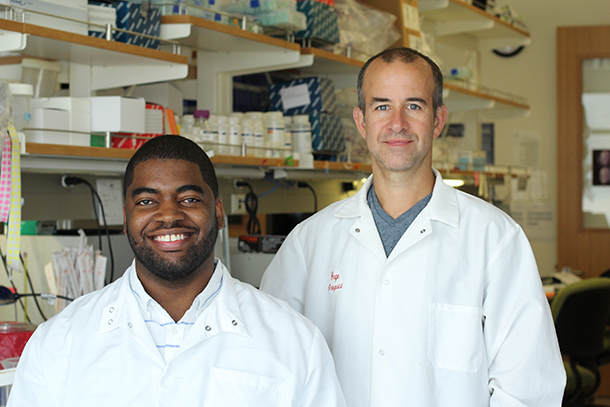D’Juan Farmer, PhD, grew up in a neighborhood where attending college — let alone pursuing a PhD or postdoctoral training — was not the expectation. Now, he’s earned the inaugural Choi Family Postdoctoral Fellowship, which provides support to recruit exceptional postdoctoral fellows to USC Stem Cell laboratories.
How did he do it? “Willpower,” said Farmer, who is pursuing his postdoctoral training in the laboratory of Gage Crump, PhD, associate professor of stem cell biology and regenerative medicine at the Keck School of Medicine of USC.
Growing up in Compton, Farmer became intrigued by medicine and science after reading “Death Be Not Proud” by John Gunther. The memoir chronicles the life of Gunther’s son, a budding scientist who succumbed to a brain tumor at age 17.
“One of my older brothers got that book for some reason from his school — as in he had to do a report, and he never read it,” Farmer said. “So I read it. I had to be in my early teens — maybe 12, 13. And I said, ‘I want to be a doctor or an oncologist.’ ”
Soon after, Farmer was admitted to the California Academy of Mathematics and Science, a highly competitive magnet high school located on the campus of California State University, Dominguez Hills.
As a UCLA undergraduate pursuing his bachelor of science in Molecular, Cell and Developmental Biology, Farmer became the first in his family to attend college, an example followed by his two younger brothers. Farmer then did a one-year post-baccalaureate fellowship at the National Institutes of Health.
As a PhD candidate in Biochemistry and Molecular Biology, he joined the laboratory of Michael McManus, PhD, at the University of California, San Francisco, where he studied the role of molecules called microRNAs in the development of the lacrimal glands that produce tears and lubricate the eyes.
As the inaugural Choi Family Postdoctoral Fellow in the Crump Lab, Farmer is looking forward to shifting his focus to craniofacial and skeletal development. He is contributing to the effort to understand a serious birth defect known as craniosynostosis, which can constrict and damage the developing brain due to the premature fusion of joints in the skull called sutures.
Farmer is grateful to the Choi Family for their support as he works toward becoming an investigator running his own laboratory at a university.
“It’s definitely the dream,” he said. “And being involved in both minority and first-generation activities is, in part, why I really like the idea of being in the academic setting. It’s great to be a mentor and improve the education system while doing science.”
— Cristy Lytal


